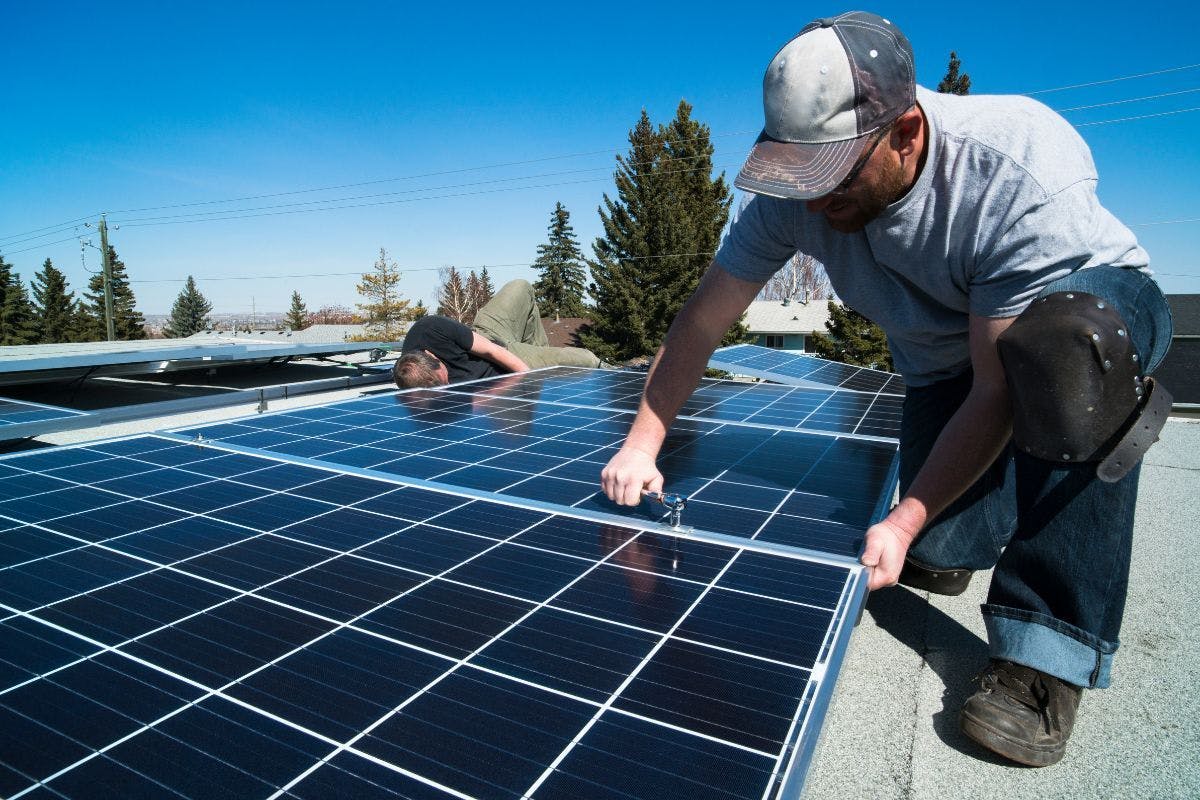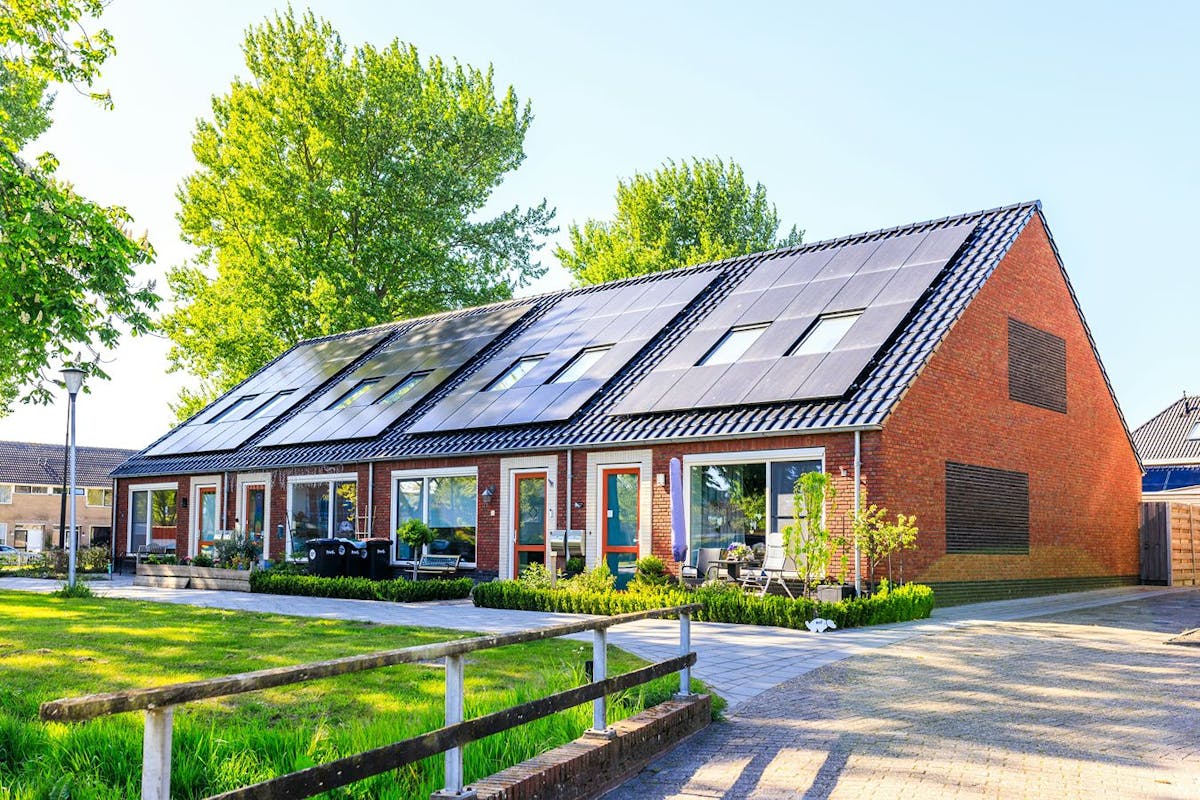Your Options at the End of a Solar Lease
Last edited

Author
Andrew Giermak
Solar and Electrification Writer and Editor

Editor
Ryan Barnett
SVP, Policy & New Market Development

Home solar panels can reduce your electricity bills for decades, and solar leases and power purchase agreements are making their benefits more accessible than ever before.
With both of those options, you don't own the panels. You just pay monthly for their use, maintenance, and service. So what happens to them when the contract is up? Here's what your end-of-lease options are.
See how much you can save by going solar with Palmetto
Post-Lease Solar Panel Removal
What happens at the end of a solar lease might vary by company and by contract. Before you make a decision about a new or existing lease, make sure you confirm your options in your contract.
While you make monthly payments for the solar panel system and use the power it produces, the panels’ owner typically is responsible for keeping them up and running.
When it’s time to call it quits and remove or replace your solar panels, that company is responsible for removing them. (Panel removal is just one option open to you at the end of a lease. More on the others below.) At the end of a LightReach Energy Plan with Palmetto, Palmetto will remove the panels for free.
It’s unlikely a crew will be there to uninstall your solar system on the day your lease expires, so there may be a delay between the end of your lease and the physical removal of your photovoltaic system components. But when it happens, it won’t cost you anything.
Extending a Solar Lease
Solar panels slowly become less efficient as they age, but they can still produce electricity after 25 years. Quality solar panels manufactured today commonly have 25-year warranties that guarantee the panels will be 80-90% as efficient as when they were new.
When you reach the end of your lease, you may have the option to extend your lease at a new rate that reflects the age of your solar panels. That could mean a few more years of energy savings with the same panels. As solar panels can generate electricity for three decades or more, renewing your lease for another few years can allow you to “squeeze all of the juice” out of your existing equipment.
It might also be possible to start a new lease from scratch with new equipment. That would get you newer and likely more efficient solar equipment, but it might cost more.
Buying Out a Solar Lease
Some solar companies will allow you to “buy out” a solar lease agreement before or after the end of the total contract period. LightReach offers buyouts starting after the fifth year.
As the new owner of the system, you will have no monthly lease payments while the panels continue to produce solar power and earn credits on your electric bill. It might be an attractive option if you want to buy solar panels, but need a few years to save up the money.
Detailed in the agreement’s “solar lease buyout clause,” the price you’d pay to buy your system is determined by the solar system’s fair market value at the time. Buying out an existing solar lease is one of your options when you sell your home.
Owning your system can be a valuable investment, but you might lose some of the perks of a lease. Once you buy your system, you’ll likely be on the hook for maintenance and responsible for removing the solar panel system when the time comes. Owning solar panels can boost your property value, which can increase your property taxes if you’re not in a state that exempts solar panels from property taxes.
See how much you can save by going solar with Palmetto
Early Termination of a Solar Lease
A solar lease is a long-term agreement, up to 25 years. The benefit is you can have long-term, predictable energy costs. The downside is canceling a lease can cost you something. See more pros and cons to consider in this article.
If you end your lease before your contract ends, you may be charged an early termination fee. Even if your lease doesn’t include an early termination fee, you may need to pay for the cost of removing the panels. At the end of your lease, panel removal may be free.
Transferring a Lease’s Ownership
Some leases, LightReach included, say ownership of the panels can be transferred to you at the end of your lease if you don’t opt for one of the options listed above. That’s not necessarily a bad thing, but you will be responsible for any ongoing maintenance and the panels’ eventual removal.
The End of Solar Leases vs. Power Purchase Agreements
Solar leases and solar power purchase agreements (PPAs) are nearly identical with a few minor structural differences. The main difference is in a solar lease you pay for the panels, while in a PPA you pay for the power those panels produce.
Both PPAs and solar leases let you install panels with little to no money upfront, indirectly receive the benefits of the solar tax credit, and can reduce your energy payments for years to come.
In general, the end of a lease and the end of a PPA should look similar, whether you're leaving the agreement early or as scheduled.
End of Solar Lease Options
When your solar lease is up, you may be able to choose from one of several contractual options to maximize the value of your renewable energy agreement.
| Option | Description |
|---|---|
| Panel removal | Your solar panels will be removed by the installer without any damage to your roof or extra costs added. |
| Renew a solar lease (short term) | Your lease will be extended for the usable life of your solar panels in shorter increments of time, typically 1-5 years. |
| Total lease renewal and panel replacement | You will get a new set of panels installed and a renewed lease for another full term of 20-25 years. |
| Buyout a solar lease | You purchase your solar equipment system outright to gain ownership of the system and its power production. |
Even though the end of your solar lease may be decades from today, it is always best to know what options you will have at the conclusion of your contract before you sign an agreement.
When you work with Palmetto, you can speak directly to a solar expert to explore your leasing or purchase options, estimate your energy savings, and develop a plan for long-term success. Get started today with a free solar design and estimate tool to preview how a solar power system can save you money.
See what solar can do for you:
Frequently Asked Questions
What happens at the end of a solar lease?
At the end of a solar lease one of a few things can happen. You can end the lease and have the panels removed, extend the lease, start a new lease with a newly-installed system, or buy the system from the leasing company. Different leases may have different stipulations, so be sure to read and understand your contract.
Can I buy my leased solar panels?
Some leases include the option to buy your leased solar panels after a certain time. LightReach plans let you purchase the panels from the end of year five through the end of the contract.
What is Palmetto’s LightReach Energy Plan?
LightReach lets you benefit from the electricity produced by panels on your roof, while Palmetto owns and maintains the solar panels for you. Every LightReach Energy Plan is custom designed for the specifics of your home, location, electricity needs, and rates. When you get a LightReach plan directly from Palmetto, it’s designed to save you money in year one.
Disclaimer: This content is for educational purposes only. Palmetto does not provide tax, legal, or accounting advice. Please consult your own tax, legal, and accounting advisors.


